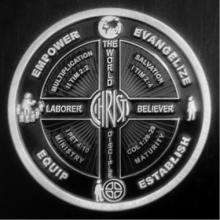Faithfully Pursuing Biblical Community
By Wes Drake, World Missions — When was the last time you tackled a particular area of needed growth? Did you do it with help from others? As Navigators, we want people to mature to the point where they will make an impact for further generations. As Americans, we tend to think individually about this. Scripture points to maturity occurring in the context of community. Community is a description of relationship. In the New Testament the writers use several terms that we might refer to as community: body, family, and church. It is in this context that the New Testament talks about growth and maturity.
Paul and the other New Testament writers use the terms brothers and family of believers throughout their letters. Furthermore, of Paul’s thirteen letters, nine of them were written to churches—communities of faith, bodies of believers. Two of the remaining four were instructions about how these churches and communities were to function and relate. Paul’s viewpoint is that spiritual maturity leading to further generations happens in the midst of relationships within a community of believers. He states this most clearly in two passages.
First, in Romans 12, Paul describes the body (spiritual community) to the Roman believers. In verse 5 he states, “each member belongs to all the others.” Here he begins describing what living out our life of sacrifice (Romans 12:1) should look like. In Romans 15:2, he reminds his audience, “Each of us should please his neighbor for his good, to build him up.” Paul’s desire in seeing them build one another up, or becoming established in the Gospel, is that “all nations might believe and obey Him”—a reference to the Great Commission and spiritual generations (Romans 16:26).
The second key passage is Ephesians 4:11-16. Paul again describes the function of the body for bringing believers to maturity. In verses 12 and 13 he states that “gifted leaders are given so that the body of Christ may be built up until we all reach unity in the faith and in the knowledge of the Son of God and become mature, that is, like Christ.” In verses 15 and 16, Paul states that speaking the truth in love, we will grow up in Christ. “The body, joined and held together by every supporting ligament, grows and builds itself up in love, as each part does its work” (v. 16). The process he describes involves multiple people living life together and contributing to one another to achieve maturity.
From Scripture and its comparison of physical and spiritual maturity we can understand that living as part of a group committed to one another is our best opportunity and God’s expected context for our growth. We learn who we are—our strengths and weaknesses. We learn how to serve as we give ourselves to one another. We discover our gifts and grow in exercising them. We learn as we observe others grow and mature. And, as we grow up in Christ together, we show others who He is.
Are you currently maturing as a disciple of Jesus in community? Will you take a moment now to consider and commit to a specific way you could strengthen that community connection? You’ll be glad you did!
Paul and the other New Testament writers use the terms brothers and family of believers throughout their letters. Furthermore, of Paul’s thirteen letters, nine of them were written to churches—communities of faith, bodies of believers. Two of the remaining four were instructions about how these churches and communities were to function and relate. Paul’s viewpoint is that spiritual maturity leading to further generations happens in the midst of relationships within a community of believers. He states this most clearly in two passages.
First, in Romans 12, Paul describes the body (spiritual community) to the Roman believers. In verse 5 he states, “each member belongs to all the others.” Here he begins describing what living out our life of sacrifice (Romans 12:1) should look like. In Romans 15:2, he reminds his audience, “Each of us should please his neighbor for his good, to build him up.” Paul’s desire in seeing them build one another up, or becoming established in the Gospel, is that “all nations might believe and obey Him”—a reference to the Great Commission and spiritual generations (Romans 16:26).
The second key passage is Ephesians 4:11-16. Paul again describes the function of the body for bringing believers to maturity. In verses 12 and 13 he states that “gifted leaders are given so that the body of Christ may be built up until we all reach unity in the faith and in the knowledge of the Son of God and become mature, that is, like Christ.” In verses 15 and 16, Paul states that speaking the truth in love, we will grow up in Christ. “The body, joined and held together by every supporting ligament, grows and builds itself up in love, as each part does its work” (v. 16). The process he describes involves multiple people living life together and contributing to one another to achieve maturity.
From Scripture and its comparison of physical and spiritual maturity we can understand that living as part of a group committed to one another is our best opportunity and God’s expected context for our growth. We learn who we are—our strengths and weaknesses. We learn how to serve as we give ourselves to one another. We discover our gifts and grow in exercising them. We learn as we observe others grow and mature. And, as we grow up in Christ together, we show others who He is.
Are you currently maturing as a disciple of Jesus in community? Will you take a moment now to consider and commit to a specific way you could strengthen that community connection? You’ll be glad you did!
More Resources
Website
This step in the disciplemaking process talks about the importance of coming alongside and supporting leaders who are trying to build community and future spiritual generations.
Audio Video
Bible Study
Check out the 20 Bible studies Military Navigators at Joint Base Lewis-McChord created as part of their Basic Di
For reference, here is the “official” Navigators Wheel Illustration webpage
Book
Recommended reading:
- InterVarsity Press “My Heart Christ’s Home”
- NavPress “The Discipline of Grace”
Staff Resources
These Christian ministries are not part of The Navigators but have a similar calling to serve the military and first responders.







